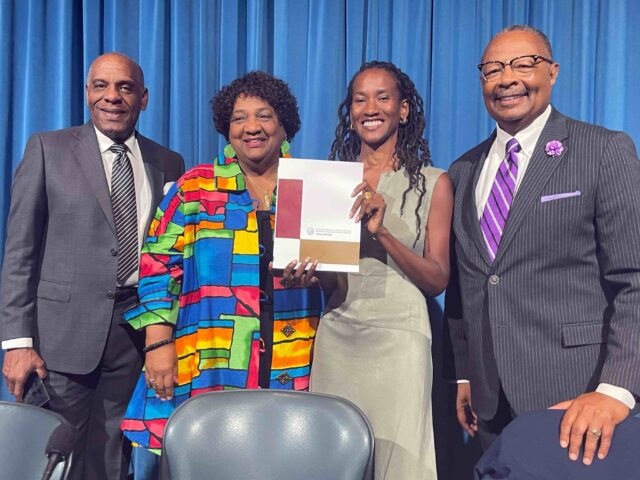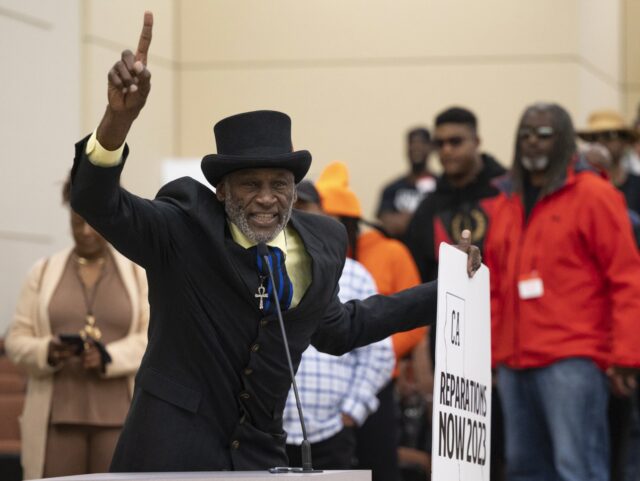California’s reparations panel delivered its final report to the state legislature on Thursday, as advocates said that what happens next could decide the outcome of the national debate on reparations for slavery.
The Los Angeles Times noted:
The conclusion of the task force’s work places political pressure on Democrats to finally deliver on their support for reparations — an issue that opinion polls show most Americans view unfavorably — with long-awaited cash payments and sweeping policy change to benefit descendants of African Americans enslaved in the United States.
The success or failure of the reparations proposal in one of the most liberal statehouses in the country will also serve as a bellwether beyond California and could carry political ramifications for the Democratic Party in the 2024 election.
“If it fails in California, that is a harbinger for the movement and that it is actually not going to gain steam in a lot of other states,” said Tatishe M. Nteta, a professor of political science at the University of Massachusetts Amherst and director of the UMass Poll. “But if it succeeds, then it has this symbolic and substantive impact that is going to be really important for this movement going forward.”
Though California entered the Union in 1850 as a free state, and banned slavery from the outset — at least formally — Gov. Gavin Newsom (D) signed a law creating the reparations committee in 2020, at the height of the Black Lives Matter movement. The committee was almost entirely made up of black members, and it held hearings across the state to gather input and to prepare recommendations for the state legislature to consider.
The final report tackles a broad range of issues, far beyond slavery. It includes “housing segregation,” “racism in environment and infrastructure,” and “pathologizing the African American family,” among other grievances. It is a massive tome: its executive summary alone is 55 pages — excluding several pages of endnotes.

From left, State Sen. Steven Bradford, Secretary of State Shirley Weber, task force member Lisa Holder and Assemblymember Reggie Jones-Sawyer hold up a final report of the California Task Force to Study and Develop Reparation Proposals for African Americans during a hearing in Sacramento, Calif., Thursday, June 29, 2023. The report heads to lawmakers who will be responsible for turning policy recommendations into legislation. Reparations will not happen until lawmakers and Gov. Gavin Newsom agree. (AP Photo/Haven Daley)
It includes lengthy calculations of what the value of reparations should be. These include compensating black Californians for the disparity in life expectancy between blacks and “non-Hispanic” whites ($966,918 per capita for each lifelong resident); compensating black Californians for the estimated costs of incarceration for black people ($159,792 each); compensating black Californians for the inequalities in wealth ascribed to housing discrimination ($148,630 each); and compensating for differences in business wealth ($77,000 each).
That thumbnail sketch of per capita reparations, approaching $1.4 million each, is not final; it would also only be available to descendants of African slaves. Even if limited to that category, it would cost hundreds of billions of dollars. The report does not say how it expects the state legislature, currently running a large deficit, to pay.
CalMatters.org recently noted:
The reparations task force report, which identifies methods for calculating reparations, suggests Black residents may be owed a total of more than $800 billion for decades of over-policing, disproportionate incarceration and housing discrimination. That price tag is more than two-and-a-half times the size of the state’s annual budget.
The report does not specify a final number, or range, but provides what it calls “an economically conservative initial assessment of what losses, at a minimum, the State of California caused or could have prevented, but did not,” and urges the state legislature to make further estimates of losses and to decide reparations accordingly.
The report also concludes that “the State of California should offer a formal apology on behalf of the People of California for the perpetration of gross human rights violations and crimes against humanity against African enslaved people and their descendants” — again, despite the fact that California was never a slave state.
Joel B. Pollak is Senior Editor-at-Large at Breitbart News and the host of Breitbart News Sunday on Sirius XM Patriot on Sunday evenings from 7 p.m. to 10 p.m. ET (4 p.m. to 7 p.m. PT). He is the author of the new biography, Rhoda: ‘Comrade Kadalie, You Are Out of Order’. He is also the author of the recent e-book, Neither Free nor Fair: The 2020 U.S. Presidential Election. He is a winner of the 2018 Robert Novak Journalism Alumni Fellowship. Follow him on Twitter at @joelpollak.

COMMENTS
Please let us know if you're having issues with commenting.